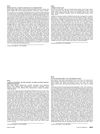Cutaneous Thrombosis and ANCA-Positive Vasculitis Associated with Propylthiouracil Therapy
January 2007
in “
Journal of The American Academy of Dermatology
”
cutaneous thrombosis ANCA-positive vasculitis propylthiouracil Graves' disease erythematous lesions bullae ecchymoses cutaneous necrosis iron deficiency anemia thrombocytosis inflammatory markers ANCA positivity PR3 pattern intravascular thrombosis focal necrotising vasculitis methylprednisolone prednisolone anticoagulation debridement grafting anti-thyroid drugs autoimmune diseases skin lesions PTU Graves' steroids blood thinners

TLDR Propylthiouracil, a thyroid medication, can cause skin blood clots and immune-related blood vessel inflammation.
The document reports on a case of cutaneous thrombosis and ANCA-positive vasculitis associated with propylthiouracil therapy in a 29-year-old woman who developed painful erythematous lesions on her lower limbs and nose after starting propylthiouracil for Graves' disease. The patient had a family history of autoimmune thyroid disease and vitiligo. She developed bullae, ecchymoses, and widespread cutaneous necrosis. Investigations showed iron deficiency anemia, thrombocytosis, raised inflammatory markers, and ANCA positivity with a PR3 pattern. A skin biopsy revealed intravascular thrombosis and focal necrotising vasculitis. The patient's propylthiouracil was discontinued, and she was treated with intravenous methylprednisolone and oral prednisolone, as well as full anticoagulation. Debridement and grafting were performed on the necrotic areas of the lower limbs, while the nose lesions resolved without tissue loss. The document highlights that anti-thyroid drugs can trigger ANCA-associated autoimmune diseases, with skin lesions being more common in drug-induced cases than idiopathic ones, and that these cases often have a milder course.






